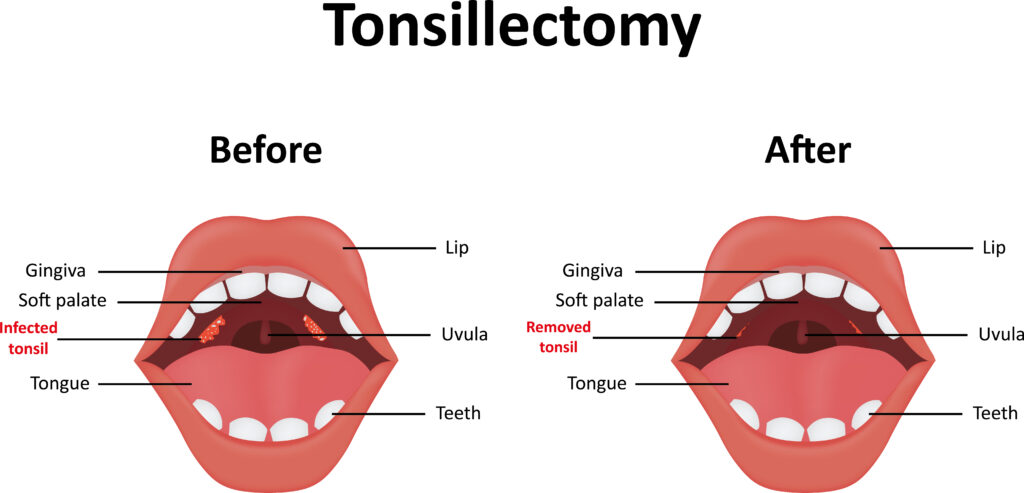
menu

Posted in Uncategorized | March 4, 2024

Do you experience frequent sore throats? Are your tonsils swollen?
You may have tonsillitis. Tonsillitis is a condition that occurs when your tonsils are infected.
Depending on your symptoms, you might require a tonsillectomy. A tonsillectomy or tonsil surgery is a standard procedure done to remove tonsils.
While it’s often recommended for children, many adults can also benefit from the procedure. Keep reading to learn more about tonsils, tonsillitis, and 4 signs you may need a tonsillectomy.

The tonsils are a pair of oval-shaped clusters of soft tissue at the back of your throat. They are part of your immune system and stop viruses and bacteria from entering your body through your mouth and nose.
Tonsils also produce white blood cells that help your body fight infections. Since your tonsils are your immune’s first line of defense, they’re especially prone to infection and inflammation.
Tonsillitis occurs when the tonsils become inflamed, sore, and red due to an infection. It can lead to persistent sore throats, difficulty swallowing, and other chronic issues.
Influenza, strep throat, mono (Epstein-Barr virus), adenovirus, and herpes simplex virus are common infections that cause tonsillitis. However, not everyone with these illnesses develops tonsillitis.
Tonsillitis can be acute, where you have a single episode of tonsillitis, or chronic, where your symptoms persist for a long time. Tonsillitis may also be recurring, which means it keeps coming back.
A tonsillectomy is the surgical removal of tonsils. The outpatient procedure takes around 30 minutes to complete. It can involve using a cauterization tool, ultrasonic vibration, and a scalpel.
When you have tonsillitis, you may experience symptoms like:

While the signs may differ from person to person, your ENT specialist at Specialty Care Institute may recommend a tonsillectomy due to the following common reasons:
Tonsillitis is considered chronic when your symptoms last over two weeks. Recurrent tonsillitis occurs when you suffer from multiple infections in a year.
More specifically, you’re diagnosed with recurrent tonsillitis when you have more than three episodes a year in three years, more than seven episodes in a year, or more than five episodes during a two-year period. Your ENT specialist may treat tonsillitis with medication.
However, if you keep developing infections repeatedly or have chronic tonsillitis that doesn’t respond to medication, then it may be time for a tonsillectomy. Tonsillectomy is an effective treatment for chronic and recurrent tonsillitis.
It can offer long-term relief and improve your quality of life.
Bad breath or halitosis is a common symptom of tonsillitis. It can happen when food waste and dead cells get stuck in the tiny grooves around or in your tonsils, called tonsillar crypts.
Accumulation in the tonsillar crypts can result in the formation of tonsil stones or tonsilloliths. Food debris, bacteria, and the warmth of inflamed tissue can trigger a chemical reaction that causes a foul odor.
If you have persistent bad breath that doesn’t go away despite good oral hygiene practices, it could be a sign that you need a tonsillectomy.
Your tonsils can become big enough to block your airway, making breathing more challenging, especially during sleep. A blocked airway can lead to obstructive sleep apnea, increasing your risk of diabetes, high blood pressure, heart disease, and other serious health conditions.
Obstructive sleep apnea is a serious sleep disorder that causes you to stop breathing many times throughout the night. Some symptoms of obstructive sleep apnea include loud snoring, poor sleep quality, excessive daytime drowsiness, morning headaches, and waking up with a sore throat or dry mouth.
If you have enlarged tonsils and snore loudly, your ENT specialist may recommend conducting a sleep study. A sleep study can show whether you have obstructive sleep apnea.
Based on the results, you may require a tonsillectomy. A tonsillectomy can significantly improve your sleep apnea symptoms and reduce the severity of your condition.
Tonsil growths are often benign. Although rare, some viruses like human papillomavirus (HPV) can cause cancerous masses to form on your tonsils.
These masses can lead to symptoms that are quite similar to tonsil infections. Keep in mind that you can develop cancer whether you have tonsils or not.
If you have abnormal growths on your tonsils, seeing your ENT specialist as soon as possible is vital. You may need a biopsy to rule out or diagnose cancer.
For patients diagnosed with tonsil cancer, treatment may include a tonsillectomy. Immunotherapy, radiotherapy, and chemotherapy could also be part of the treatment plan.

The experienced ENT specialists at Specialty Care Institute offer expert diagnosis and best-in-class treatment for tonsillitis. If a tonsillectomy is necessary, we’ll guide you through the entire process, ensuring a comfortable and safe experience.
Are you concerned about your tonsils? Schedule your appointment today at Specialty Care Institute in Barrington, Arlington Heights, Elgin, and Hoffman Estates, IL, to discuss your symptoms and find the relief you need. Why wait when you could feel better and improve your life?